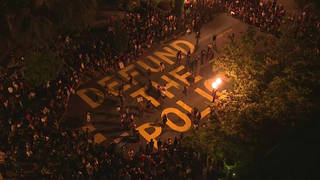
Guests
- Robin Wonsleyorganizer, activist and the first Black Democratic Socialist city councilmember in Minneapolis.
We speak with Minneapolis City Councilmember Robin Wonsley, the first Black Democratic Socialist on the City Council, about the Justice Department’s newly released probe into the city’s police department that found systemic problems with discrimination and excessive force and concluded: “The patterns and practices we observed made what happened to George Floyd possible.” Wonsley says “none of this is new,” and demands a strong community role in public safety reforms expected to follow the report.
Transcript
AMY GOODMAN: But, Robin, I also want to ask you about the latest news coming as the Justice Department has accused the Minneapolis Police Department of disproportionately targeting Black and Native American people and frequently using excessive and unlawful use of force. The findings come in an investigation launched after the police killing of George Floyd in May of 2020. Attorney General Merrick Garland spoke Friday.
ATTORNEY GENERAL MERRICK GARLAND: The patterns and practices we observed made what happened to George Floyd possible. As one city leader told us, quote, “These systemic issues didn’t just occur on May 25th, 2020. There were instances like that, that were being reported by the community long before that.”
AMY GOODMAN: Robin Wonsley, your response, as a longtime Minneapolis organizer and activist, as a Minneapolis, now, city councilmember?
ROBIN WONSLEY: Yeah, it’s very interesting to hear, you know, Merrick Garland, again, share those findings, and hearing that in contrast with talking about the Minnesota Miracle 2.0, because since George Floyd’s murder, what we’ve experienced here in Minneapolis has been nothing close to a miracle, but it has felt like a Minneapolis nightmare, under the Frey administration specifically. Under Mayor Frey’s administration, which I will note, you know, the DOJ findings or investigation period took place from 2016 to 2022, the entire tenure of Mayor Frey’s administration. We also, a year ago, had the investigation be led by the Minnesota Department of Human Rights, that also found that MPD, Minneapolis Police Department, had engaged in a violent, racist and misogynistic series of patterns and practices against residents. And that investigation fell within 2010 to 2020, so about three years of Mayor Frey’s tenure as mayor. And over the course of his entire tenure, Mayor Frey has remained the sole executive authority over MPD. And the findings have made it clear that he turned a blind eye to a rogue, violent and racist police department, as well as, I want to say, council. That is noted in the Minnesota Department of Human Rights findings, as well, that councilmembers, some of those that are still there today, turned a blind eye to the police department, that led to not only the events of George Floyd, but acknowledging that there is dozens of victims prior to George Floyd and even afterwards.
So, I want to name — you know, and Merrick Garland said this himself. For residents here in Minneapolis, the findings that were released from the DOJ, as well as the Minnesota Department of Human Rights, they’re not new. They’re not surprising. This has been the reality of working-class people, especially Black and Brown and Indigenous working-class folks in our city, for a decade. And our elected officials have ignored the pleas and the cries and the testimonies of those communities when they talked repeatedly about the violence they experienced at the hands of the police. And instead, what we’re seeing is a Frey administration that is still ramming through a status quo model of policing. Most recently, he’s trying to push through the rebuilding of the 3rd Precinct, despite opposition from the public around that. We’ve had taxpayers have to fork over, you know, more than $50 million in misconduct settlement cases that police have caused. Taxpayers have also had to pay over $60 million in workers’ compensation claims that MPD officers have used as a way to flee the police department as it undergoes or are being mandated to undergo these robust reforms by now the Minnesota Department of Human Rights and the Department of Justice.
So, in light of that, again, none of this is new, but what I think is most important in these conversations is, again, this has happened under Mayor Frey’s tenure. Mayor Frey has repeatedly shown, as indicated in these findings, that he is not competent in exercising his authority to hold our racist and misogynistic police department accountable. And as a result of that, and, actually, as a result of community members persistently organizing for a new model of comprehensive public safety, that do things like what’s highlighted in the DOJ report, as well as the Minnesota Department of Human Rights, like creating mental health responders, the community should be at the table for this consent decree around the DOJ.
AMY GOODMAN: And, Robin Wonsley, we’re going to continue this conversation, but we have to end right now, Minneapolis city councilmember. Thanks so much for joining us, also Peter Callaghan, staff writer at the MinnPost.
Next up, as the president’s son Hunter Biden reaches a deal with federal prosecutors, we’ll speak with The Intercept’s Ken Klippenstein. His piece, “What Does the FBI Have on Hunter and Joe Biden?” Back in 30 seconds.












Media Options